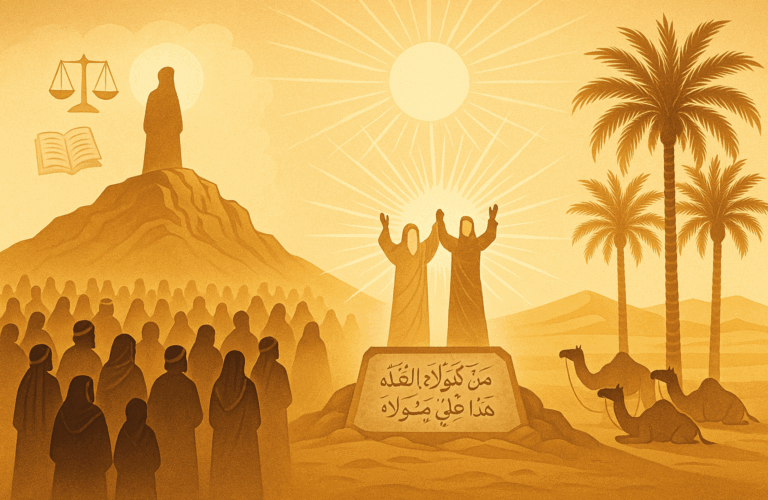Happy birthday to greatest man to walk the face of this earth.
Reflections by Sheikh Jehad Ismail
At a time when mankind and human civilisation were on the edge of destruction, the The Al-Mighty and Wise caused a man to be born in Arabia who was entrusted with the most difficult task!
Not only to rescue mankind from imminent destruction but also to raise it to sublime heights!
Heights beyond the knowledge of historians and the imagination of poets
If there were not incontrovertible (undeniable) historical evidence to demonstrate his achievements, it would be difficult to believe such greatness had in fact existed.
This man was Muhammad the beloved.
He saved mankind from imminent danger, gave it new life, new ambition, fresh energy, a revitalised sense of human dignity and intellect, and a new found idealism.
It was because of him that a new era came into existence.
An era of spirituality in art and literature, of personal sincerity and selfless service to others, all of which produced an ordered, graceful and kindly culture.
His most precious gifts to man were his devotion to righteousness and aversion to evil.
And forever a readiness to lay down one’s life for these righteous goals.
Such goals ultimately are the fountainhead and incentive for all reforms and improvements in the life of humanity.
That great benefactor of humanity replaced barbarism and brutality with the yoke of human kindness, magnanimity and courtesy.
He struggled unceasingly for the propagation of his noble teachings with complete disregard for his own self, his life or prestige.
Precisely because of this struggle, there arose from among an uncivilized and illiterate people noble-hearted men who led a graceful and kindly life.
Men who started a new era of courtesy and warmth in human history, who engendered gentleness and goodness in those around them.
The world obtained a fresh lease of life!
Justice and fairness became its hallmark;
The weak were emboldened to claim their rights from the haughty and strong;
While mercy and kindness became the norms.
It was a time when humanitarianism became a driving force, faith and conviction captured human hearts and mankind began to take pride in selflessness.
While virtuous behaviour became habitual with people.
We list below, in brief, the precious gifts the prophet introduced which have played a key role in the advancement of human values and culture.
A new and bright world, quite different from the decaying and disintegrating humanity at the time of its advent, came into being as a result of these Prophetic contributions:
- The clear and unambiguous creed of the Oneness of God.
- The concept of human equality and brotherhood.
- The concept of human dignity and man being the masterpiece of God’s creation.
- Acknowledgement of the proper status of women and the restoration of their legitimate rights.
- The rejection of despair and the infusion of hope and confidence in human beings.
- The fusion of the secular and the sacred, the refusal to accept any cleavage between them.
- The integration of religion and knowledge, making one dependent on the other and raising respect for knowledge by declaring it a means of attaining nearness to God.
- Emphasis on the use of intellectual faculties in religious and spiritual matters and encouraging the study and contemplation of natural phenomena.
- Charging the followers of Islam with the responsibility of spreading virtue and goodness in the world, and making it a duty incumbent on them to restore truth and justice.
- The establishment of a universal creed and culture purely on the basis of choice and not force as there is no compulsion in religion.
I would further like to cite a few eminent western thinkers and writers who have acknowledged these virtues of Islam.
One of these candid men, Lamartine of France, says in his tribute to the prophethood of Muhammad (p):
If greatness of purpose, smallness of means, and astounding results are the three criteria of human genius, who could dare to compare any great man in modern history with Muhammed?
The most famous men created arms, laws and empires only.
They founded, if anything at all, no more than material powers which often crumbled away before their eyes.
This man moved not only armies, legislations, empires, peoples and dynasties, but millions of men in one-third of the then inhabited world; and more than that, he moved the altars, the gods, the religions, the ideas, the beliefs and souls.
On the basis of a Book, every letter of which has become law, he created a spiritual nationality which blended together peoples of every tongue and of every race.
He has left us as the indelible characteristic of his Muslim nationality, the hatred of false gods and the passion for the One and immaterial God.
This avenging patriotism of Heaven formed the virtue of the followers of Mohammad; the conquest of one-third of the earth to this dogma was his miracle; or rather it was not the miracle of man but that of reason.
The idea of the unity of God, proclaimed amidst the exhaustion of fabulous the genies, was in itself such a miracle that upon its utterance from his lips it destroyed all the ancient temples of idols and set on fire one-third of the world.
John William Draper, the reputed author of A History of the Intellectual Development of Europe, writes:
Four years after the death of Justinian, A.D. 569, was born at Mecca, in Arabia, the man who, of all men, has exercised the greatest influence upon the human race.
He says further:
Muhammad possessed that combination of qualities which more than once has decided the fate of empires … Asserting that everlasting truth, he did not engage in vain metaphysics, but applied himself to improving the social condition of the people by regulations respecting personal cleanliness, sobriety, fasting and prayer.
The religion of Muhammad will be the system upon which peace and contentment will be founded. The world today is in dire need of a man like Muhammad to solve its complex problems.
Sir George Bernard-Shaw
There is no doubt that the Prophet Muhammad was a great reformer who did a magnificent service to human society. It is honor enough to say that he guided a whole nation to the light of truth and caused it to incline towards stability and peace and to prefer an ascetic lifestyle. He prevented it from shedding blood and presenting human sacrifices. He opened up for it the way of prosperity and civic living. This is a tremendous achievement, which can only be undertaken by a powerful personality. A man like this is worthy of respect and honor.
Europe has begun now to sense the wisdom of Muhammad and has developed a passion for his religion. It will also come to exonerate Islamic doctrine from all the false accusations laid at its door by Europeans in the Middle Ages. The religion of Muhammad will be the system upon which peace and contentment will be founded. From his Philosophy, Europe will derive the solution to perplexities, problems and complexities . . . Many of my fellow countrymen and other Europeans venerate the teachings of Islam. Hence I confirm my prophecy by saying that the first stirrings of the age of European Islam are near, this is inevitable.
Yes, the world today is in dire need of a man like Muhammad to solve its complex problems.
Muhammad was abstemious and simple in his abode, his food and his drink and his clothing and in the rest of his life and conditions. His food consisted mainly of bread with dates and water. He often mended his own clothes. What could be more honorable than this?
Hail Muhammad the Prophet of rough clothing and food, who strived, was active during the day and awake during the night and persistent in promoting the religion of Allah. He was not one to covet that which lesser men covet such as rank, empire and power. He is in truth the Prophet of the sublime morals.
A silent great soul – one that who could not but be earnest, he was to kindle the world as the Maker of the world had ordered so. The lies which well-meaning zeal has heaped round this man [Muhammad] are disgraceful to us only.
The renowned Russian writer Count Leo Nikolayevich Tolstoi:
I wanted to know the best of the life of one who holds today an undisputed sway over the hearts of millions of mankind…. I became more than ever convinced that it was not the sword that won a place for Islam in those days in the scheme of life. It was the rigid simplicity, the utter self- effacement of the Prophet the scrupulous regard for pledges, his intense devotion to his friends and followers, his intrepidity, his fearlessness, his absolute trust in God and in his own mission. These and not the sword carried everything before them and surmounted every obstacle. When I closed the second volume (of the Prophet’s biography), I was sorry there was not more for me to read of that great life.
Mahatma Gandhi, statement published in ‘Young India’ 1924:
My choice of Muhammad (570 CE – 630 CE) to lead the list of the world’s most influential persons may surprise some readers and may be questioned by others, but he was the only man in history who was supremely successful on both the secular and religious level. …It is probable that the relative influence of Muhammad on Islam has been larger than the combined influence of Jesus Christ and St. Paul on Christianity. …It is this unparalleled combination of secular and religious influence which I feel entitles Muhammad to be considered the most influential single figure in human history.
Michael H. Hart, “The 100: A Ranking of the Most Influential Persons in History”, New York, 1987.
No other religion in history spread so rapidly as Islam. The West has widely believed that this surge of religion was made possible by the sword. But no modern scholar accepts this idea, and the Quran is explicit in the support of the freedom of conscience.
James Michener ‘Islam: The Misunderstood Religion’ Reader’s Digest, May 1955, pp. 68-70
I hold the religion of Muhammad in the highest esteem for its astounding vitality. It seems to me to be the only religion which is equipped to suit the changing faces of life and which is appropriate for all ages. I have studied the life of this amazing man and I believe that he deserves to be called the savior of the human race.
If any religion had the chance of ruling over England, nay Europe within the next hundred years, it could be Islam. I believe that if a man like him were to assume the dictatorship of the modern world he would succeed in solving its problems in a way that would bring it the much needed peace and happiness: I have prophesied about the faith of Muhammad that it would be acceptable to the Europe of tomorrow as it is beginning to be acceptable to the Europe of today.”
The English philosopher Thomas Carlyle ‘Heroes, Hero Worship and the Heroic in History’ 1840
Never has a man set for himself, voluntarily or involuntarily, a more sublime aim, since this aim was superhuman; to subvert superstitions which had been imposed between man and his Creator, to render God unto man and man unto God; to restore the rational and sacred idea of divinity amidst the chaos of the material and disfigured gods of idolatry, then existing.
Never has a man undertaken a work so far beyond human power with so feeble means, for he (Muhammad) had in the conception as well as in the execution of such a great design, no other instrument than himself and no other aid except a handful of men living in a corner of the desert.
Finally, never has a man accomplished such a huge and lasting revolution in the world, because in less than two centuries after its appearance, Islam, in faith and in arms, reigned over the whole of Arabia, and conquered, in God’s name, Persia, Western India, Abyssinia, Syria, Egypt, all the known continent of Northern Africa, Spain, etc.
If greatness of purpose, smallness of means, and astounding results are the three criteria of human genius, who could dare to compare any great man in modern history with Muhammad? The most famous men have created arms, laws and empires only. They founded, if anything at all, no more than material powers which often crumbled before their eyes. This man moved not only armies, legislations, empires, peoples and dynasties, but millions of men in one-third of the then inhabited world; and more than that, he moved the altars, the gods, the religions, the ideas, the beliefs and souls . . . his forbearance in victory, his ambition, which was entirely devoted to one idea and in no manner striving for an empire; his endless prayers, his mystic conversations with God, his death and his triumph after death; all these attest not to an imposture but to a firm conviction which gave him the power to restore a dogma. This dogma was twofold, the unity of God and the immateriality of God – the former telling what God is, the latter what God is not.
Philosopher, Orator, Apostle, Legislator, Warrior, Conqueror of Ideas, Restorer of Rational beliefs… The Founder of twenty terrestrial empires and of one Spiritual Empire – that is Muhammad. As regards all standards by which human greatness may be measured, we may ask, is there any man greater than he?
Alphonse de La Martaine ‘Historie de la Turquie’, v. ii, Paris, 1854
His simple eloquence, rendered impressive by the expression of a countenance wherein awfulness of majesty was tempered by an amiable sweetness, excited emotions of veneration and love; and he was gifted with that authoritative air of genius which alike influences the learned and commands the illiterate. As a friend and a parent, he exhibited the softest feelings of our nature . . . With all that simplicity which is so natural to a great mind, he performed the humbler offices whose homeliness it would be idle to conceal with pompous diction; even while Lord of Arabia, he mended his own shoes and coarse woolen garments, milked the ewes, swept the hearth, and kindled the fire, dates and water were his usual fare, and milk and honey his luxuries. When he travelled he divided his morsel with his servant.
John Davenport “An Apology for Mohammed and the Koran” London 1869
Head of the State as well as the Church, he was Caesar and Pope in one; but he was Pope without Pope’s pretensions, and Caesar without the legions of Caesar: without a standing army, without a bodyguard, without a palace, without a fixed revenue. if ever any man had the right to say that he ruled by the divine right, it was Mohammad, for he had all the power without its instruments and without its supports. He cared not for the dressings of power. The simplicity of his private life was in keeping with his public life.
In Mohammedanism everything is different here. Instead of the shadowy and the mysterious, we have history…. We know of the external history of Muhammad…. while for his internal history after his mission had been proclaimed, we have a book absolutely unique in its origin, in its preservation…. on the Substantial authority of which no one has ever been able to cast a serious doubt.
Reverend Bosworth Smith “Mohammed and Mohammedanism” London 1874
The good sense of Mohammed despised the pomp of royalty. The Apostle of God submitted to the menial offices of the family; he kindled the fire; swept the floor; milked the ewes; and mended with his own hands his shoes and garments.
Mohammed – was distinguished by the beauty of his person that was an outward gift, which is seldom despised, except by those to whom it has been refused. Before he spoke, the orator engaged on his side the affections whether of a public or a private audience. They applauded his commanding presence, his majestic aspect, his piercing eye, his gracious smile, his flowing beard, his countenance, which painted every sensation of his soul, and the gestures that enforced each expression of the tongue. In the familiar offices of life, he scrupulously adhered to the grave and ceremonious politeness of his country; his respectful attention to the rich and powerful was dignified by his condescension and affability to the poorest citizen of Mecca; his memory was capacious and retentive, his wit easy and social, his imagination sublime, his judgement clear, rapid and decisive. He possessed the courage both of thought and action; bears the stamp of an original and superior genius.
Edward Gibbon “Decline and Fall of the Roman Empire” 1823
History makes it clear, however, that the legend of fanatical Muslims sweeping through the world and forcing Islam at the point of sword upon conquered races is one of the most fantastically absurd myths that historians have ever repeated.
De Lacy O’Leary ‘Islam at the Crossroads’ London, 1923
Incidentally these well-established facts dispose of the idea so widely fostered in Christian writings that the Muslims, wherever they went, forced people to accept Islam at the point of the sword.
Lawrence E. Browne ‘The Prospects of Islam’ 1944
To suppose Muhammad an impostor raises more problems that it solves. Moreover, none of the great figures of history is so poorly appreciated in the West as Muhammad…. Thus, not merely must we credit Muhammad with essential honesty and integrity of purpose, if we are to understand him at all. If we are to correct the errors we have inherited from the past, we must not forget that the conclusive proof is a much stricter requirement than a show of plausibility, and in a matter such as this, it is only to be attained with difficulty.
W. Montgomery Watt ‘Muhammad at Mecca’ Oxford, 1953
Muhammad, the Messenger of Islam, exhibited for most of his life if not all of his life a striking moderateness. His final victory points to a greatness of character rarely to be found in history. He ordered his army to give quarter to the old and the weak, the children and the women, and warned them against destroying houses or pillaging or cutting down fruiting trees. He ordered them not to draw their swords except in dire need. It is even said that he used to rebuke some of his generals and physically put right their mistakes.
Emil Dirmargen, Orientalist, “The Life of Muhammad”
Muhammad, the Messenger of Allah was courageous in fighting battles himself giving strength and endurance to the hearts of those who were weaker. He was merciful with the weak, and would give refuge to a great number of the needy in his house. Although he maintained a reverential aura, he had a plain manner about him with no affectation whatsoever. He was cheerful and easy to deal with and with an even temper not easily angered by inquisitive people and always had a smile on his face.
There is no doubt that he had many traits which made him attractive to the people of his time, but he had conveyed to those people a sublime example in religion and morals, and transcended the old notions under which they were suffering. When he had gathered them as one body under the banner of this sublime example, he made from them a power, which later shook the very foundations of the Ancient world.
Florandes & Marseille – The Eastern World
Muhammad, the messenger of Islam possessed noble traits such as gentleness, bravery, and the noblest of morals. A person was not able to evaluate him without being affected by these attributes. Muhammad bore the enmity of his family and tribe for years without losing determination or strength. His nobility was such that he would never be the first to withdraw his hand from one who shook hands with him even from a child and he would never pass by a group of people men or children without giving a greeting of peace, all the while smiling sweetly and with beautiful words which would enchant he who heard them and win his heart.
The English Orientalist Hollen Paul
The Quran is a splendid humanistic document, which explains in detail the secret of the behaviour of Muhammad in all the events of his life. We even find therein an additional subject matter through which we are able to follow the progress of Islam from its inception and appearance in its early history. We do not find the like in Buddhism or Christianity or any of the other ancient religions. These are the unique features of Islam and they confirm and prove that it is the complete religion for humanity and that it is the religion of the future.
The Scottish Orientalist Ronald A. Nicholson
The greatest success of Mohammad’s life was affected by sheer moral force. It is not the propagation but the permanency of his religion that deserves our wonder; the same pure and perfect impression, which he engraved at Mecca and Medina is preserved after the revolutions of twelve centuries by the Indian, the African and the Turkish proselytes of the Koran….
The Mohammedans have uniformly withstood the temptation of reducing the object of their faith and devotion to a level with the senses and imagination of man. ‘I believe in One God and Mohammad the Apostle of God’ is the simple and invariable profession of Islam. The intellectual image of the Deity has never been degraded by any visible idol; the honors of the prophet have never transgressed the measure of human virtue, and his living precepts have restrained the gratitude of his disciples within the bounds of reason and religion.
Edward Gibbon & Simon Oakley ‘History of the Saracen Empire’ London, 1870
Islam is a religion that is essentially rationalistic in the widest sense of this term considered etymologically and historically…. the teachings of the Prophet, the Quran has invariably kept its place as the fundamental starting point, and the dogma of unity of God has always been proclaimed therein with a grandeur a majesty, an invariable purity and with a note of sure conviction, which it is hard to find surpassed outside the pale of Islam…. A creed so precise, so stripped of all theological complexities and consequently so accessible to the ordinary understanding might be expected to possess and does indeed possess a marvelous power of winning its way into the consciences of men.
T. W. Arnold ‘The Preaching of Islam’ London 1913
Four years after the death of Justinian, A.D. 569, was born in Mecca, in Arabia, the man who, of all men, has exercised the greatest influence upon the human race… To be the religious head of many empires, to guide the daily life of one-third of the human race, may perhaps justify the title of a Messenger of God.
Dr. William Draper ‘History of Intellectual Development of Europe’
The Arabian Prophet had powerful and strong morals and a personality, which weighed up, examined, and tested every step he took in his life. There is no fault in his character whatsoever. Given that we are in need of a complete paradigm to fulfil our needs in life, the personality of Muhammad the Holy Prophet fulfils this need. It is the mirror, which reflects for us lofty reasoning, magnanimity, nobility, bravery, patience, kindness, humility, forgiveness, humbleness and modesty and all the essential morals of which humanitarianism. We see this present in the personality of the Prophet Muhammad in glowing colors.
Lord Hadleigh
I thought and prayed for forty years so that I might arrive at the truth. I must confess that my visit to the Islamic east filled me with respect for the serene [Islamic] faith, which induces one to worship God all throughout one’s life not just on Sundays. I am eternally grateful to God that he has guided me to Islam, which has become a firm reality in my heart and has allowed me to attain happiness and tranquility, which previously were not attainable. I was in a dark cavern, then Islam took me out into an expansive land illuminated by the Sun and I began to smell the pure fresh sea air.
Lantern of Light extends their heartwarming felicitations on the auspicious birth anniversary of our beloved Prophet Muhammad saw and our 6th Holy Imam Ja’far Al-Sadiq a.s.
There is a lot of suffering around the globe and our humanity is hurting. Let us soar to God, raise our hands in prayers for all those inflicted with trials and may Allah swt protect us all.
Please do share this reflective article with as many souls as possible to transform the lives of beautiful humanity.
Lantern of Light extends their heartwarming felicitations on the auspicious birth anniversary of our beloved Prophet Muhammad saw and our 6th Holy Imam Ja’far Al-Sadiq a.s.
There is a lot of suffering around the globe and our humanity is hurting. Let us soar to God, raise our hands in prayers for all those inflicted with trials and may Allah swt protect us all.
Please do share this reflective article with as many souls as possible to transform the lives of beautiful humanity.





Comments